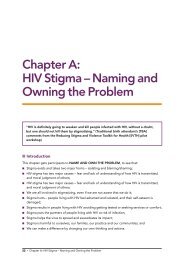Implementing Multiple Gender Strategies to Improve HIV and ... - ICRW
Implementing Multiple Gender Strategies to Improve HIV and ... - ICRW
Implementing Multiple Gender Strategies to Improve HIV and ... - ICRW
Create successful ePaper yourself
Turn your PDF publications into a flip-book with our unique Google optimized e-Paper software.
• Community leaders including traditional religious <strong>and</strong> municipal<br />
leaders, teachers, etc.<br />
Level of Intervention • Individual<br />
• Family<br />
• Community<br />
• Municipality<br />
Geographic<br />
Location<br />
• Eastern Cape Province – OR Tambo municipality<br />
• KwaZulu-Natal Province – Nk<strong>and</strong>la municipality<br />
Timeframe November 2006–November 2008<br />
Funders<br />
United Nations Children’s Fund (UNICEF)<br />
Partner<br />
Organizations<br />
Implementation partners:<br />
• Sizanani Village Trust<br />
• Nk<strong>and</strong>la <strong>HIV</strong>/AIDS Network<br />
• Umtata Child Abuse Resource Centre<br />
• Siyakhanyis<br />
IMPLEMENTATION AND RESULTS<br />
Start-up <strong>and</strong><br />
Implementation<br />
Process<br />
The project conducted a participa<strong>to</strong>ry needs assessment with focus group<br />
discussions with male, female, <strong>and</strong> youth stakeholders, between the ages<br />
of 14 <strong>and</strong> 65, in Mthatha in 2006. These discussions focused on attitudes,<br />
feelings, beliefs, <strong>and</strong> experiences about men’s roles regarding gender roles<br />
<strong>and</strong> relations, <strong>HIV</strong> <strong>and</strong> AIDS, <strong>and</strong> child protection. They particularly focused<br />
on identifying strategies that men could use <strong>to</strong> prevent violence <strong>and</strong><br />
respond <strong>to</strong> <strong>HIV</strong> <strong>and</strong> AIDS, <strong>and</strong> the ways in which these issues affect<br />
children. One part of the discussion identified the barriers that prevent men<br />
from participating more in fatherhood, care <strong>and</strong> support, or advocating<br />
against violence against women <strong>and</strong> gender inequality. A common theme<br />
among these discussions was that men must speak out <strong>and</strong> act against<br />
violence in their community. Findings were used <strong>to</strong> shape the design of the<br />
project.<br />
In the initial phase of project implementation, local baseline research was<br />
conducted around violence against women <strong>and</strong> children, health promotion,<br />
<strong>HIV</strong> treatment <strong>and</strong> prevention, <strong>and</strong> care <strong>and</strong> protection of orphans <strong>and</strong><br />
vulnerable children. Sonke also trained partner organizations in using the<br />
One Man Can methodology, which emphasizes community action for social<br />
change through the formation of community action teams (CATs) in both<br />
Nk<strong>and</strong>la (KwaZulu Natal Province) <strong>and</strong> in OR Thambo district (Eastern<br />
Cape Province).<br />
In addition, in the first nine months, project activities focused on 1)<br />
developing new materials suited <strong>to</strong> encouraging men in rural areas <strong>to</strong> take<br />
action, <strong>and</strong> 2) establishing support for <strong>and</strong> collaboration on the project<br />
among a number of different stakeholders from government <strong>and</strong> civil<br />
116
















